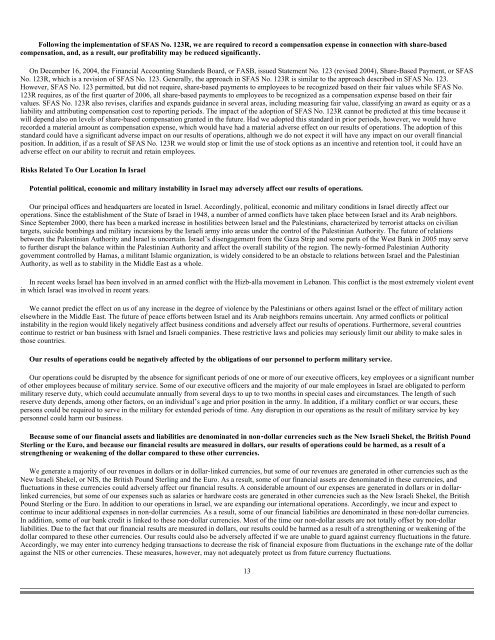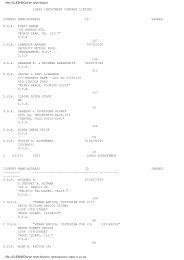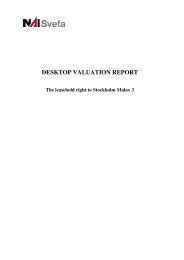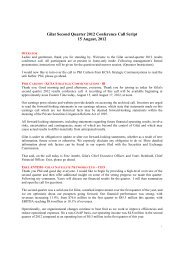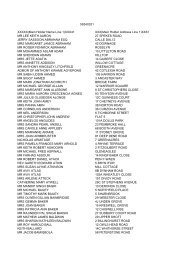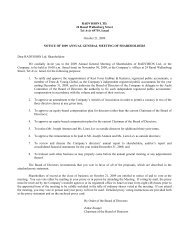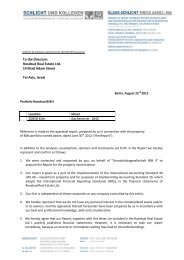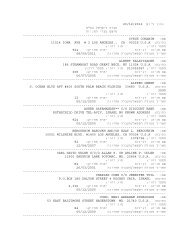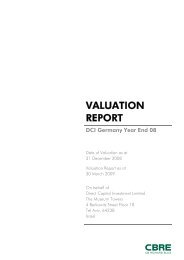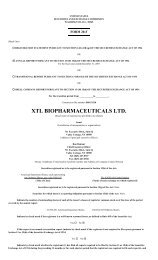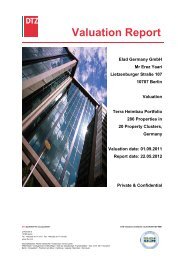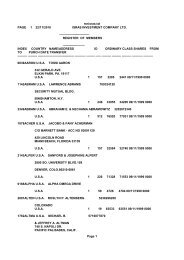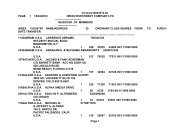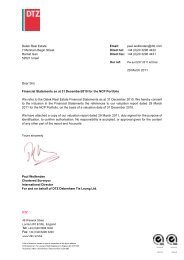RETALIX LTD.
RETALIX LTD.
RETALIX LTD.
Create successful ePaper yourself
Turn your PDF publications into a flip-book with our unique Google optimized e-Paper software.
Following the implementation of SFAS No. 123R, we are required to record a compensation expense in connection with share-based<br />
compensation, and, as a result, our profitability may be reduced significantly.<br />
On December 16, 2004, the Financial Accounting Standards Board, or FASB, issued Statement No. 123 (revised 2004), Share-Based Payment, or SFAS<br />
No. 123R, which is a revision of SFAS No. 123. Generally, the approach in SFAS No. 123R is similar to the approach described in SFAS No. 123.<br />
However, SFAS No. 123 permitted, but did not require, share-based payments to employees to be recognized based on their fair values while SFAS No.<br />
123R requires, as of the first quarter of 2006, all share-based payments to employees to be recognized as a compensation expense based on their fair<br />
values. SFAS No. 123R also revises, clarifies and expands guidance in several areas, including measuring fair value, classifying an award as equity or as a<br />
liability and attributing compensation cost to reporting periods. The impact of the adoption of SFAS No. 123R cannot be predicted at this time because it<br />
will depend also on levels of share-based compensation granted in the future. Had we adopted this standard in prior periods, however, we would have<br />
recorded a material amount as compensation expense, which would have had a material adverse effect on our results of operations. The adoption of this<br />
standard could have a significant adverse impact on our results of operations, although we do not expect it will have any impact on our overall financial<br />
position. In addition, if as a result of SFAS No. 123R we would stop or limit the use of stock options as an incentive and retention tool, it could have an<br />
adverse effect on our ability to recruit and retain employees.<br />
Risks Related To Our Location In Israel<br />
Potential political, economic and military instability in Israel may adversely affect our results of operations.<br />
Our principal offices and headquarters are located in Israel. Accordingly, political, economic and military conditions in Israel directly affect our<br />
operations. Since the establishment of the State of Israel in 1948, a number of armed conflicts have taken place between Israel and its Arab neighbors.<br />
Since September 2000, there has been a marked increase in hostilities between Israel and the Palestinians, characterized by terrorist attacks on civilian<br />
targets, suicide bombings and military incursions by the Israeli army into areas under the control of the Palestinian Authority. The future of relations<br />
between the Palestinian Authority and Israel is uncertain. Israel’s disengagement from the Gaza Strip and some parts of the West Bank in 2005 may serve<br />
to further disrupt the balance within the Palestinian Authority and affect the overall stability of the region. The newly-formed Palestinian Authority<br />
government controlled by Hamas, a militant Islamic organization, is widely considered to be an obstacle to relations between Israel and the Palestinian<br />
Authority, as well as to stability in the Middle East as a whole.<br />
In recent weeks Israel has been involved in an armed conflict with the Hizb-alla movement in Lebanon. This conflict is the most extremely violent event<br />
in which Israel was involved in recent years.<br />
We cannot predict the effect on us of any increase in the degree of violence by the Palestinians or others against Israel or the effect of military action<br />
elsewhere in the Middle East. The future of peace efforts between Israel and its Arab neighbors remains uncertain. Any armed conflicts or political<br />
instability in the region would likely negatively affect business conditions and adversely affect our results of operations. Furthermore, several countries<br />
continue to restrict or ban business with Israel and Israeli companies. These restrictive laws and policies may seriously limit our ability to make sales in<br />
those countries.<br />
Our results of operations could be negatively affected by the obligations of our personnel to perform military service.<br />
Our operations could be disrupted by the absence for significant periods of one or more of our executive officers, key employees or a significant number<br />
of other employees because of military service. Some of our executive officers and the majority of our male employees in Israel are obligated to perform<br />
military reserve duty, which could accumulate annually from several days to up to two months in special cases and circumstances. The length of such<br />
reserve duty depends, among other factors, on an individual’s age and prior position in the army. In addition, if a military conflict or war occurs, these<br />
persons could be required to serve in the military for extended periods of time. Any disruption in our operations as the result of military service by key<br />
personnel could harm our business.<br />
Because some of our financial assets and liabilities are denominated in non-dollar currencies such as the New Israeli Shekel, the British Pound<br />
Sterling or the Euro, and because our financial results are measured in dollars, our results of operations could be harmed, as a result of a<br />
strengthening or weakening of the dollar compared to these other currencies.<br />
We generate a majority of our revenues in dollars or in dollar-linked currencies, but some of our revenues are generated in other currencies such as the<br />
New Israeli Shekel, or NIS, the British Pound Sterling and the Euro. As a result, some of our financial assets are denominated in these currencies, and<br />
fluctuations in these currencies could adversely affect our financial results. A considerable amount of our expenses are generated in dollars or in dollarlinked<br />
currencies, but some of our expenses such as salaries or hardware costs are generated in other currencies such as the New Israeli Shekel, the British<br />
Pound Sterling or the Euro. In addition to our operations in Israel, we are expanding our international operations. Accordingly, we incur and expect to<br />
continue to incur additional expenses in non-dollar currencies. As a result, some of our financial liabilities are denominated in these non-dollar currencies.<br />
In addition, some of our bank credit is linked to these non-dollar currencies. Most of the time our non-dollar assets are not totally offset by non-dollar<br />
liabilities. Due to the fact that our financial results are measured in dollars, our results could be harmed as a result of a strengthening or weakening of the<br />
dollar compared to these other currencies. Our results could also be adversely affected if we are unable to guard against currency fluctuations in the future.<br />
Accordingly, we may enter into currency hedging transactions to decrease the risk of financial exposure from fluctuations in the exchange rate of the dollar<br />
against the NIS or other currencies. These measures, however, may not adequately protect us from future currency fluctuations.<br />
13


